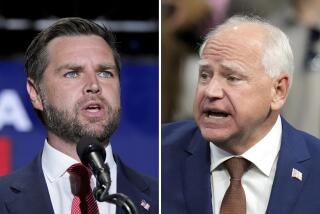Adequate, Yet Unimaginative : Yet by Keeping Focus on Dukakis, Quayle Wins One for Bush
- Share via
The question repeatedly asked of Sen. Dan Quayle on Wednesday night--”What would you do if you became President?”--seemed at first absurd and eventually unfair because the interrogation came across as a thinly veiled attempt to rattle the candidate, rather than elicit information from him.
Quayle should have stood his ground and asked NBC’s Tom Brokaw to elaborate on the hypothetical world situation at the time so that he could begin to know how to answer the question. Did the United States face an international crisis? Did the Republicans or the Democrats control the Senate? Was Mikhail Gorbachev still in charge in the Soviet Union? And so the absurdity of the question would have been exposed.
Nonetheless, it is reasonable for journalists to treat the tension of a nationally televised debate as an opportunity to test the candidates’ ability to think on their feet, rather than as an opportunity to elicit policy positions. Everyone knows that this is the real purpose of the exercise. One of the candidates indeed might end up in the Oval Office, where he might have to make swift and irrevocable decisions. Is he up to it, or is she? (Isn’t it interesting that in 1984 Walter Mondale’s vice presidential candidate, Rep. Geraldine Ferraro, was not subjected to any comparable scrutiny or interrogation?)
How did Quayle come through the ordeal? Adequately, in the sense that he didn’t panic or get angry. But he was also unimaginative. He didn’t have the wit to respond to a hypothetical question with a request for more information--and insist that this was the only way he could answer the question. Instead he kept returning to the dull recitation of his resume, showing that he had in all probability been coached to give just this one answer and wasn’t deft enough to think of another answer to the same question.
Incidentally, has anyone noticed that the interrogatory--”What would you do if you became President?”--was a much more appropriate question for Sen. Lloyd Bentsen than it was for Quayle. Alas, Quayle himself didn’t notice. He could have pointed out that unlike the Dukakis-Bentsen ticket, there were no substantive policy differences between himself and George Bush. Thus, if he became President, he could have said that he would pursue Bush’s policies. Would Bentsen pursue the policies of a hypothetically deceased Michael Dukakis, in the unlikely event that he outlive him? (I know, it’s easy to think these things up one day late.)
What about Bentsen’s put-down: “Senator, you are no Jack Kennedy.” This plainly was unfair. Repeatedly pressed about his credentials, Quayle merely made the true assertion that he had “as much experience in the Congress as Jack Kennedy did when he sought the presidency.” For Bentsen to treat this as though Quayle were vaingloriously equating himself with the slain President was a cheap shot.
It’s hard to say how this will play out in the days ahead. Bentsen may no more benefit from his jibe than did Sen. Robert Dole after his 1976 vice presidential debate with Mondale. To many Republicans, Dole’s hard-edged, professionally delivered one-liners seemed pretty terrific at the moment. In retrospect, they seemed merely harsh and the mild, good-natured Mondale was the winner.
As the Quayle-Bentsen debate unfolded, an unexpected winner turned out to be liberalism itself. The idea that expanded government is the cure for an ever-widening range of problems was embedded in at least six questions. One has grown to expect nothing else from the journalists of the day. Such questions are congruent with Democratic policies and as such played into Bentsen’s hand. All the more reason, then, for Quayle to challenge the premise of the questions. But he didn’t. Whether they dealt with Social Security, “65 million American children who live with their families in poverty” (65 million ?), farm policy, drug addiction, “the Greenhouse Effect” or occupational safety, Quayle was eager to reassure the audience that the Republicans will do more of what the Democrats prescribe. “To help the poor,” he said, “we’ll have a commitment to the programs, and those programs will go on, and we are spending more in poverty programs today than we were in 1981.” Still other programs would “get through in a George Bush Administration.” Thanks, Dan. Maybe we should all vote Democratic, then, if that is what the country really needs. Republicans really should try to be something other than better Democrats.
On the other hand, Bentsen couldn’t avoid the glaring inconsistency in the Democrats’ new-found enthusiasm for deficit-bashing. If the budget deficit must indeed be abolished, and spending must be increased, as he kept urging, the average voter listening to Bentsen could reasonably conclude that the Democrats plan to raise taxes, whether they admit it or not. Quayle, incidentally, deserves full marks for his answer to a question about the United States as a “debtor nation.” He pointed out that this means that people want to invest in America, which is the “envy of the world.” He is right about that, and he deftly admonished those in the audience who tittered.
A curious feature of the debate was that, whereas Quayle wanted to make Dukakis the issue, and to some extent was successful in doing so, Bentsen did not attempt to make Bush the issue. To that extent, then, my impression was that, although Bentsen probably beat Quayle on points, Bush himself may have scored an unexpected triumph over Dukakis.
More to Read
Get the L.A. Times Politics newsletter
Deeply reported insights into legislation, politics and policy from Sacramento, Washington and beyond. In your inbox twice per week.
You may occasionally receive promotional content from the Los Angeles Times.










